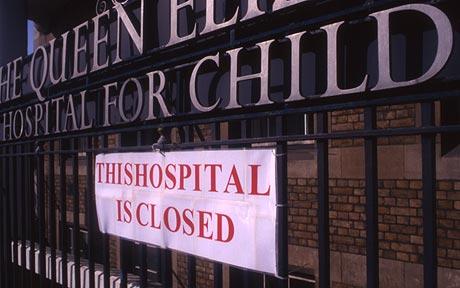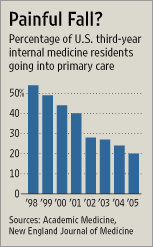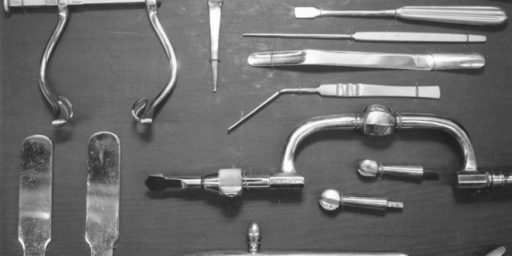British National Health Service in Trouble?
Depending on which papers you read, the British NHS is undergoing minor restructuring, secretly planning major cuts in basic services, or doing nothing of concern.
 As part of a massive overhaul to deal with an out-of-control budget, the Cameron Government is going to streamline England’s part of the NHS. NYT (“Britain Plans to Decentralize Health Care“):
As part of a massive overhaul to deal with an out-of-control budget, the Cameron Government is going to streamline England’s part of the NHS. NYT (“Britain Plans to Decentralize Health Care“):
Even as the new coalition government said it would make enormous cuts in the public sector, it initially promised to leave health care alone. But in one of its most surprising moves so far, it has done the opposite, proposing what would be the most radical reorganization of the National Health Service, as the system is called, since its inception in 1948. Practical details of the plan are still sketchy. But its aim is clear: to shift control of England’s $160 billion annual health budget from a centralized bureaucracy to doctors at the local level. Under the plan, $100 billion to $125 billion a year would be meted out to general practitioners, who would use the money to buy services from hospitals and other health care providers. The plan would also shrink the bureaucratic apparatus, in keeping with the government’s goal to effect $30 billion in “efficiency savings” in the health budget by 2014 and to reduce administrative costs by 45 percent. Tens of thousands of jobs would be lost because layers of bureaucracy would be abolished. In a document, or white paper, outlining the plan, the government admitted that the changes would “cause significant disruption and loss of jobs.” But it said: “The current architecture of the health system has developed piecemeal, involves duplication and is unwieldy. Liberating the N.H.S., and putting power in the hands of patients and clinicians, means we will be able to effect a radical simplification, and remove layers of management.” The health secretary, Andrew Lansley, also promised to put more power in the hands of patients. Currently, how and where patients are treated, and by whom, is largely determined by decisions made by 150 entities known as primary care trusts — all of which would be abolished under the plan, with some of those choices going to patients. It would also abolish many current government-set targets, like limits on how long patients have to wait for treatment.
Curious to see how this was playing out in the UK press, I looked around a bit.
Earlier in the week, FT had a report (“NHS premium threatens GP incomes“) on a related restructuring:
Family doctors face losing part of their current income to pay for an incentive for good quality commissioning and for keeping National Health Service costs under control, the government proposed on Thursday. The “premium” payment would have to come from within existing resources, the Department of Health said, with the GP consortia – who under the government’s plans will be buying the bulk of NHS care – then deciding which practices within the consortia will receive the payment. The proposal that “if you come in over budget you will lose money” will “scare people”, said Dr Laurence Buckman, chairman of the British Medical Association’s family doctors committee. With the NHS already in deficit in some parts of the country, and with a big squeeze to come on spending, the proposal would worry GPs, Dr Buckman said. “How scary it will be will depend on how much is involved”.
The Telegraph titles its story “Secret plan to ‘brutally’ slash NHS services” on the front page but “Axe falls on NHS services” on the article page itself, adding a brutal subheadline: “NHS bosses have drawn up secret plans for sweeping cuts to services, with restrictions on the most basic treatments for the sick and injured.”
An investigation by The Sunday Telegraph has uncovered widespread cuts planned across the NHS, many of which have already been agreed by senior health service officials. They include: * Restrictions on some of the most basic and common operations, including hip and knee replacements, cataract surgery and orthodontic procedures. * Plans to cut hundreds of thousands of pounds from budgets for the terminally ill, with dying cancer patients to be told to manage their own symptoms if their condition worsens at evenings or weekends. * The closure of nursing homes for the elderly. * A reduction in acute hospital beds, including those for the mentally ill, with targets to discourage GPs from sending patients to hospitals and reduce the number of people using accident and emergency departments. * Tighter rationing of NHS funding for IVF treatment, and for surgery for obesity. * Thousands of job losses at NHS hospitals, including 500 staff to go at a trust where cancer patients recently suffered delays in diagnosis and treatment because of staff shortages. * Cost-cutting programmes in paediatric and maternity services, care of the elderly and services that provide respite breaks to long-term carers. The Sunday Telegraph found the details of hundreds of cuts buried in obscure appendices to lengthy policy and strategy documents published by trusts. In most cases, local communities appear to be unaware of the plans.
Well, that’s certainly a different view than one gets from NYT!
How about the more staid Times? Nothing at all on the front page, which has room above-the-fold for “Royal family open for inspection on Flickr,” “The new £200 Brazilian. Have you had yours yet?” and “Exclusive: just bring vibes – at home with Prince.” Their site search is abysmal but, best I can tell, they haven’t covered the story in close to a month.
Then I remembered that the Sunday Times had been spun off to its own site. But it, too, was ignoring the story.
Both sites, naturally, have annoying pop-ups trying to get readers to register.
Oddly, the Times and Sunday Times are also ignoring a report on the inequality of health care in the UK that BBC, Telegraph, and others seized on Friday. BBC (“Health gap ‘wider than in Great Depression‘”):
Between 1999 to 2007, for every 100 deaths before the age of 65 in the richest 10th of areas, there were 212 in the poorest 10th.
This compared with 191 deaths in the poorest areas from 1921 to 1930 and 185 deaths from 1931 to 1939.
The spread in the reporting on this story is quite bizarre. It’s important enough to make the NYT but not the London Times? And it’s something between a bureaucratic restructuring and a massive plot to deprive the poor of basic care? And they’re already suffering so much!






Having lived and worked in the UK for a while, I read about the proposed restructuring with interest (thegovt have published a white paper but it’s very sketchy). It sounds like a Rubik’s cube to me. I literally couldn’t understand how it was going to work so I guess we’ll have to wait for some more substance, but giving tens of thousands of General Practioners who act as gatekeepers for the whole system control over small budgets of around 3.5 million pounds sounds like a recipe for bureaucratic chaos. The mixed press comment is curious. The Telegraph and Times are both distinctly conservative in sympathy so the alarmism of the Telegraph seems odd whereas the Times playing the whole thing down would be more expected. The gap in health deaths is for largely for the same reasons it exists here. Lower income groups tend to smoke more, have unhealthier diets etc.
James, this post has no title, and therefore no link to it on your main page. I had to follow the link from my feed reader to get here.
Thanks, Michael — it’s been fixed. I stopped it while publishing to make edits and it erased the title.
Well from the NYT it sounds like they are more trying to restructure the system and I am curious to see if this plan will work and more important do what ti wants to do.
The Telegraph doesn’t sound anything like the NYT so it will be interesting to see what the plan actually is and reaction to it.
IIRC, the GPs are currently paid by the NHS, but are not employees. This will be an interesting attempt to try to privatize the system a bit, with the government just acting as a payer. Will there be less rationing when a GP’s salary depends on limiting care? Incentives matter.
Steve